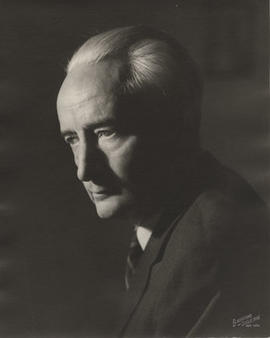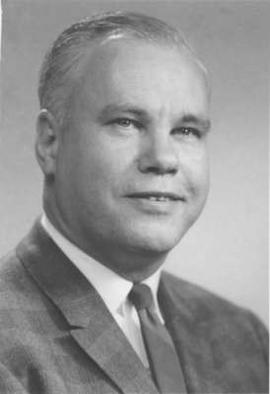Wilfrid Laurier (1841-1919) was Canada's eighth Prime Minister, holding office 1896-1911. Laurier was born in St. Lin, Quebec. He received a law degree from McGill University in 1864, and practiced law in Montreal and Arthabaskville from 1864-1896. Wilfrid Laurier was Liberal party leader from 1887 until his death in 1919.
Eugene Kash (1912-2004) was a Canadian violinist, conductor and teacher. He was married to contralto Maureen Forrester from 1957 to 1974.
Jim Heldmann is an alumnus of Wilfrid Laurier University having graduated with a BA in 1958 and an MA in 1990. As an undergraduate, Heldmann was a member of the editorial staff of the Cord as well as News Weekly where wrote the humor advice column “Miss Winks”. He was also a member of the Keystone editorial staff and the curling team.
Personal Studio was founded by Robert T.G. Nicol and a friend, and officially opened for business on March 21, 1946. Nicol was the sole photographer and owner by the fall of 1946. For the next fifty years Robert Nicol documented the Waterloo Region through personal and commercial photography. He pioneered the concept of wedding albums in the local area. He had started flying in 1961 and from that time on took aerial photographs as well as studio and candid photography. In the course of his career he maintained memberships in professional photographers' organizations as well as completing continuing photographic educational courses offered by those organizations. He retired as a professional photographer in 1996.
The Faculty of Science at Wilfrid Laurier University was founded in 2000, when the Faculty of Arts and Sciences partitioned into distinct faculties of Arts and Science. The Faculty consists of the Departments of Biology, Chemistry, Kinesiology and Physical Education, Mathematics, Physics and Computer Science, Psychology and the Health Sciences program. Deans of the Faculty of Science have been Dr. Arthur Szabo (2000-2007), Dr. Deb MacLatchy (2007-2009), and Dr. Paul Jessop (2009- present).
The Faculty is predominantly housed in the Science Building which was officially opened in 1995. Eventually the Science Research Centre (opened in 2004) was added between the Science and Bricker Academic Buildings. The Research Centre is a dedicated research building for faculty and students.
In 2000, the Faculty of Science mandate was as follows:
“Laurier’s Faculty of Science is dedicated to collaboration between and beyond its six departments. In that spirit, the Faculty offers selected high quality programs with homes in Biology, Chemistry, Kinesiology & Physical Education, Mathematics, Physics and Computer Science and Psychology. Its programs are contemporary and competitive, designed to attract the highest quality students, and to provide them with a stimulating education and thorough preparation for employment or further studies. That Faculty holds the advance of scientific knowledge as one of its key values, and as such is committed to sustaining a supportive climate for research in the pure, social and applied sciences. The Faculty’s spirit of shared enterprise is highly valued by its members.”
Waterloo Lutheran Seminary (WLS) officially opened on October 30, 1911 in Waterloo, Ontario in a house located on five acres of land donated by the City of Waterloo. The first class consisted of four students and one full-time faculty member, Ottomar Lincke. Lincke would also serve as the first executive officer until 1914. In 1924, Waterloo College was established, providing courses in post-secondary education. The following year, the Seminary and Waterloo College affiliated with the University of Western Ontario (UWO) allowing students to earn an accredited degree. Women were allowed to attend to Waterloo College beginning in 1929.
In 1960 Waterloo College ended its affiliation with the University of Western Ontario and became an independent, degree granting institution called Waterloo Lutheran University that operated alongside the Seminary.
The current Seminary building was dedicated on October 20th, 1963. In 1973 Waterloo Lutheran University became a provincially-funded, secular institution and was renamed Wilfrid Laurier University. The Lutheran Church was no longer responsible for the operating the University but the Waterloo Lutheran Seminary remained a federated college of Wilfrid Laurier University.
In the 1980s, the Waterloo Lutheran Seminary gained full accreditation status in the Association of Theological Schools in the United States and Canada. In 1994, a Doctor of Ministry degree was added. The year 2010 saw the creation of the Kanata Centre for Worship and Global Song, which seeks to bridge the cultural gap between developed and less developed countries. Currently, the Seminary offers a variety of diploma, master’s and doctoral programs, as well as a Bachelor of Arts in Christian Studies and Global Citizenship.
James Gordon Nelson, (1932- ) was a professor at the University of Waterloo, in Waterloo, Ontario until his retirement in 1998. Nelson received his BA from McMaster University, his MA from Colorado, and his PhD from Johns Hopkins University. Before accepting a position with the University of Waterloo in 1975, Nelson held academic and administrative positions at the University of Calgary and the University of Western Ontario. He is an ecologist, a geographer, a planner, and a policy maker. James Gordon Nelson has been a member of the College of Fellows of the Royal Canadian Geographic Society, a committee member of the World Commission on Protected Areas of the International Union for Conservation of Nature and Natural Resources, a member of the National Executive Committee of the Canadian Parks and Wilderness, and Ontario's Representative on the National Board of Governors of Heritage Canada. He has received many awards, including the first Natural Heritage Award in 1978, the Canadian Association of Geographers Award for Scholarly Distinction in Geography in 1983, the Massey Medal for the Royal Canadian Geographic Society in 1983, a Certificate of Achievement from the Grand River Conservation Authority in 1994, and the 1994 Environment Award for the Regional Municipality of Waterloo.
Gotthard Booth (1899-1975) was a medical doctor specializing in the practice of psychiatry concerned with chronic physical diseases, psychosomatic medicine, and studies in the relationship between religion and health. Born in Nuremberg, Germany, Booth graduated from the University of Munich Medical School in 1923, and in the early 1930s moved to the United States. He resided in Westport, Connecticut but maintained a practice in New York City. Booth taught at Columbia University from 1945 to 1953, was instructor for one year at the New York Medical College, and from 1962 was consulting psychiatrist for the Union Theological Seminary, New York. In 1965 he became a visiting lecturer at Waterloo Lutheran University (now Wilfrid Laurier University) and its federated college, Waterloo Lutheran Seminary. A fellow of the American Psychiatric Association, Booth's research resulted in the publication of more than 60 articles. He worked as a research associate with the New York Psychiatric Institute for ten years. He was also a member of the American Psychosomatic Society, the Academy of Psychosomatic Medicine, the New York County Medical Society, and the American Medical Association.
Herman Overgaard (1920-2000) was an author, administrator, and professor at Wilfrid Laurier University in Waterloo, Ontario. He obtained his BA from the University of Manitoba, and his MS and PhD from Columbia University. In 1947 Overgaard became an assistant professor in the Department of Economics and Business Administration at Waterloo College (now Wilfrid Laurier University). He held various positions at the university, including Department Chair; Director, School of Business and Economics; and Director of Summer School, Orillia Campus. After retiring in 1986 Overgaard continued to teach on a part-time basis until 1991. In 2000 Herman Overgaard received an Honorary Doctor of Laws degree from Wilfrid Laurier University.
Theresa McClenaghan (1962-) is a Canadian lawyer. She has pursued public interest environmental law throughout her career, representing individuals, groups, and First Nations in environmental matters of local, regional, and national significance. McClenaghan obtained her LLB from the University of Western Ontario, an LLM from Osgood Hall Law School, York University, and a diploma in Environmental Health from McMaster University. She has been called to the bar of Manitoba and Ontario, and has practiced law in Kitchener, Paris, and Toronto, Ontario.

